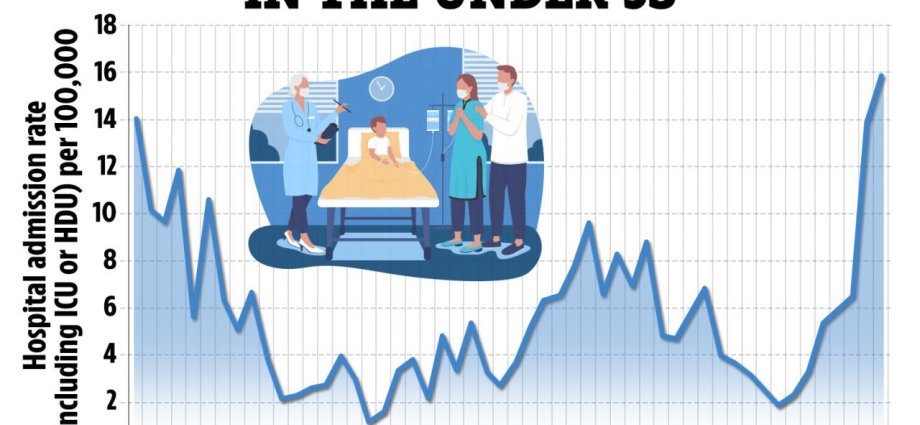THE number of children in hospital with a deadly virus has soared in the last week, official data has revealed.
Respiratory syncytial virus (RSV) is the cause of death for thousands of kids under five, across the world.

Now data from the UK Health Security Agency (UKHSA) has revealed that not only have cases risen – but that hospitalisations have also surged in the under 5s.
Dr Conall Watson, consultant epidemiologist for the UKHSA, said the rise in cases and hospitalisations at this time of year is expected.
“For children under two, RSV can be severe – particularly for babies and those born prematurely,” he said.
RSV infections increased by 8.3 per cent in the week ending October 30, with the highest rates in the under 5s at 29.3 per cent.
Read more on RSV
The UKHSA data also shows visits to A&E for bronchiolitis (an infection commonly caused by RSV) in the under 1s have also increased.
As have hospitalisations for RSV in the under 5s with more than 16 children per 100,000 of the population in that group admitted for treatment – higher than any other age group.
It comes as cases of other bugs, including flu continue to rise, while the latest wave of Covid cases appears to be subsiding.
Experts have warned that some young children may not have built up any immunity to bugs like RSV and flu, due to Covid lockdowns.
Most read in Health
The ‘stay at home’ directive meant that the common bugs couldn’t circulate as normal, and as a result lots of children – and adults – have no immunity.
Dr Watson said with cases of RSV and flu on the rise, it is important that people remember basic hygiene measures that can help prevent infection.
“Actions like using tissues and handwashing can reduce spread to the most vulnerable,” he said.
“If you are ill, do not visit babies. If you are worried your infant has cold symptoms with any unusual breathing or difficulty feeding, please contact 111 or your GP.
“If your child seems seriously unwell, trust your judgement and get emergency care.”
SYMPTOM CHECKER
RSV is common virus that usually affects children before their second birthday – in most cases causing nothing more than a cold.
But, in a small number of cases, RSV can lead to serious complications including bronchiolitis (inflammation of the small airways of the lungs) or pneumonia, which can prove life-threatening.
RSV can cause cold-like symptoms, including a cough and runny nose, which can last between one to two weeks.
If you spot the below symptoms, it’s important to call your GP, and if your child is seriously unwell, always dial 999.
The five signs you need to know:
- Trouble breathing
- Cough producing yellow, green, or grey mucus
- Unusually upset or inactive
- Refuses to breastfeed or bottle-feed
- Signs of dehydration – lack of tears when crying, little or no urine in the nappy for six hours, and cool, dry skin.
If your baby is very tired, breathes rapidly, or has a blue tint to the lips or fingernails, get medical attention immediately.
RISK FACTORS
Professor Harish Nair, Chair of Paediatric Infectious Diseases and Global Health at the University of Edinburgh previously said that parents can help their children by encouraging frequent handwashing and disinfecting surfaces and toys.
Prof Nair, who is involved in Sanofi’s Together Against RSV campaign added: “Cold and damp homes can predispose infants to a number of respiratory illnesses, such as wheezing, asthma, bronchiolitis and pneumonia including those due to respiratory syncytial virus (RSV).
“With the cost of living increasing and many families likely to find it difficult to heat their homes this winter, children’s vulnerability to illness could be increased and this could impact the number of RSV cases significantly bringing extra strain on the NHS.
“RSV is a common infection in children and while most cases are mild, some cases can be more severe and require hospital care.
“It’s essential parents understand what RSV is and how to protect their children against it.”
FLU IS UP
The UKHSA report also shows cases of flu are rising in younger age groups.
Rates are estimated to be highest among people aged 15 to 44, with 13.4 per cent of laboratory samples from this age group testing positive.
Rates are second highest in those aged five to 14 year-olds, with 10.4 per cent of samples from this age group testing positive.
Hospital admissions for flu decreased slightly during the week and were highest in the 85 and over age group, the UKHSA said.
Covid-19 hospital admissions also fell but were highest in the 85 and over age group.
Overall levels of flu are still low, meaning it is too early to predict how big the wave of infections will be.
In total around 33 million people in England can get a free flu vaccine this year, including everyone aged 50 and over, all primary-age children and some secondary-age children.
Read More on The Sun
The vaccine is also being offered to pregnant women, people in care homes, frontline health and social care staff, carers, those aged six to 49 with a specified health condition, and household contacts of people with weakened immune systems.
All two and three-year-olds are eligible for a flu nasal spray vaccine, which will be offered by their local GP.















